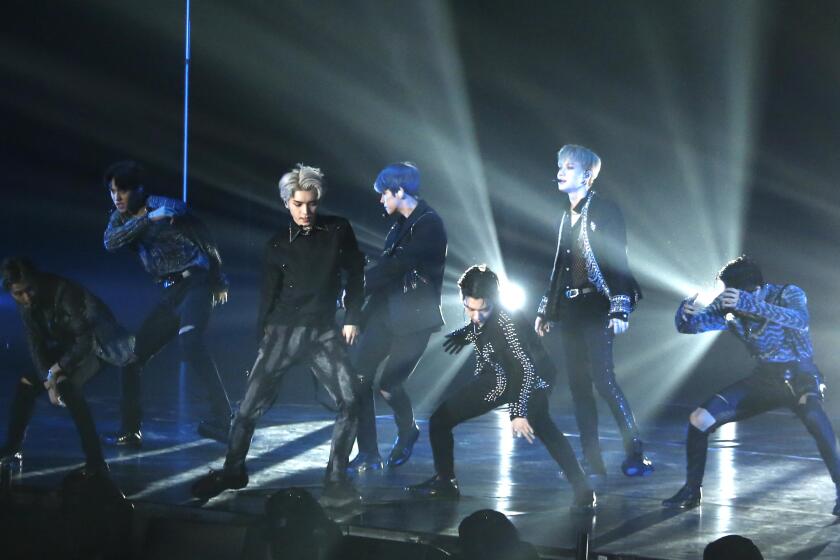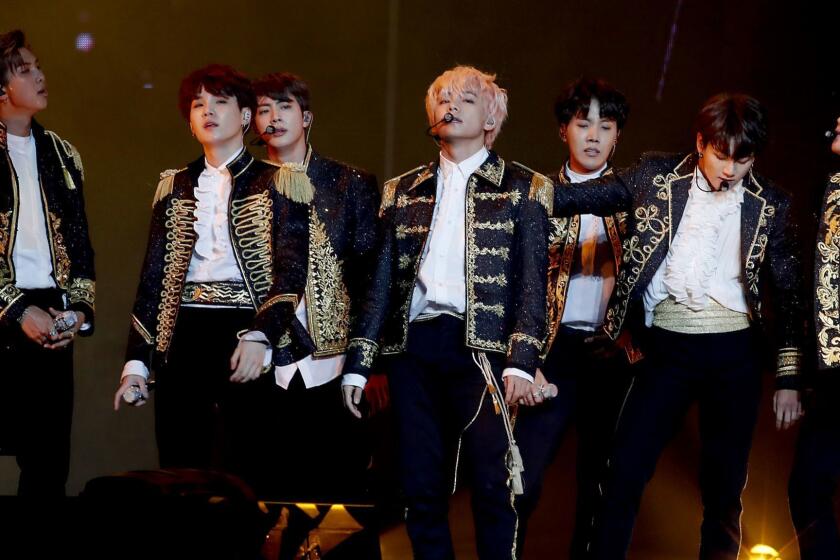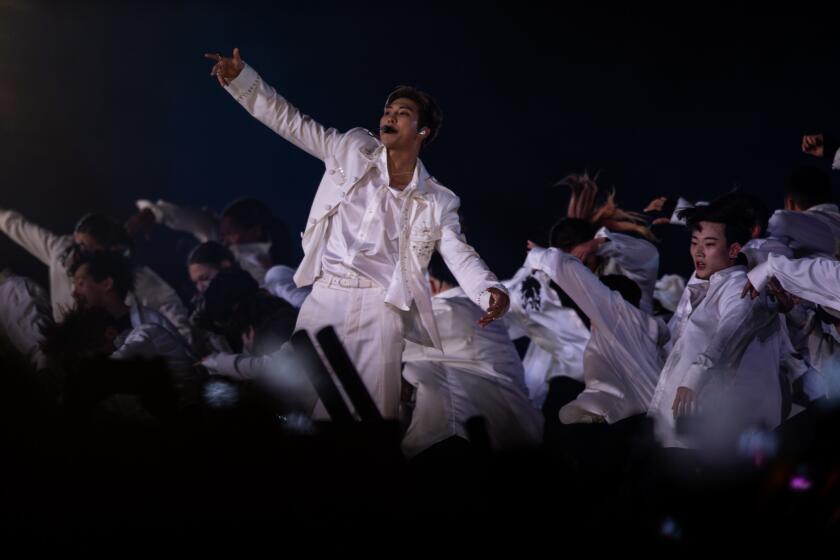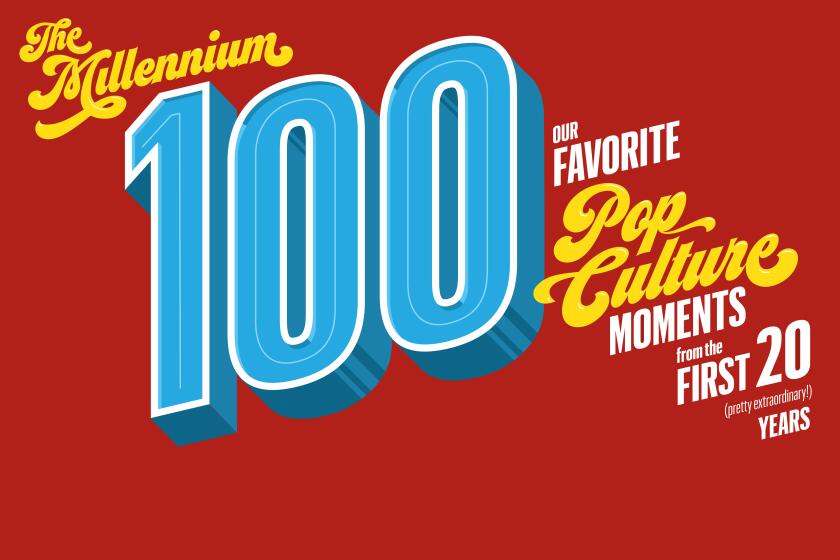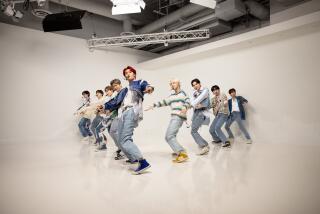BTS album review: ‘Map of the Soul: 7’ charts a path forward for K-pop
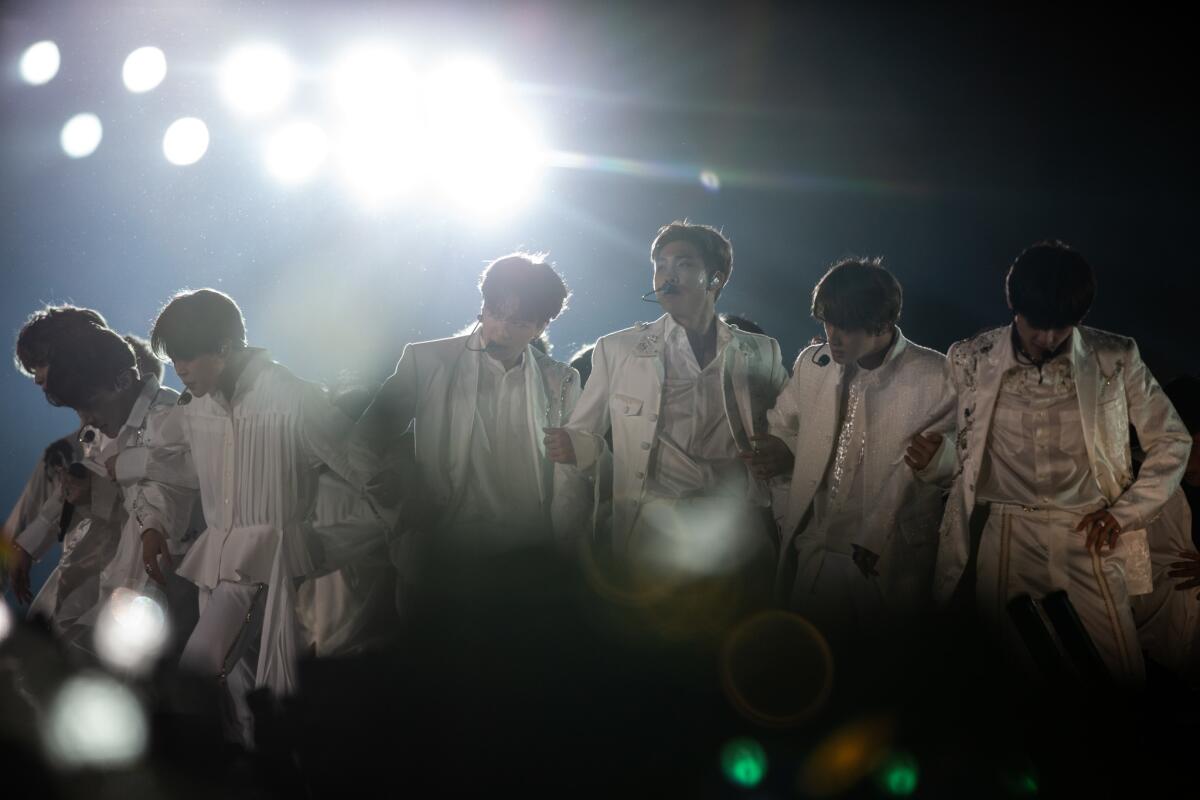
- Share via
If there’s a digital-age equivalent to camping outside a record store waiting for a new album to drop, it’s what BTS fans did overnight: hovering over Spotify or Apple Music, pouring some very strong coffee and waiting for 1 a.m. PST to arrive, so they could finally stream “Map of the Soul: 7” when it landed.
The new album from the biggest K-pop group in the world is a global record biz event like no other, a comprehensive 20-song collection that looks forward, backward and all around the K-pop landscape that RM, Suga, J-Hope, Jin, Jimin, Jungkook and V helped create. It booked more than 4 million presales, easily eclipsing the year-end tally of its predecessor, “Map of the Soul: Persona” (and that’s not even counting the streams to come).
There’s never been a more surefire Billboard chart-topper in recent pop. To quote their countryman, “Parasite” director Bong Joon Ho, it makes any other event in music seem quaintly “local.”
K-pop supergroup SuperM scored a U.S. No. 1 debut and sold out the Forum. Are they the next BTS?
But fortunately, the album is also a fantastic summary of BTS’ accomplishments so far, and charts a path forward in a tumultuous but exciting new era for K-pop. It’s an album about being in a band, about the relationships that form and get tested in the crucible of insane fame, all set to some of the most genre-invigorating music of their career. If you were hitting “refresh” in the blue glow of your phone all night, BTS has richly rewarded your patience.
Dedicated BTS Army troops will immediately notice that the front quarter of this gargantuan album is previously released material from “Persona,” the 2019 EP that pivoted the band from their smash hit “Love Yourself” trilogy into this new period.
“Boy With Luv,” “Make It Right,” “Dionysus” and “Jamais Vu” will be plenty familiar at this point. Maybe there’s someone out there hearing them for the first time on this album, but they’re likely placed here as context, almost like a map of the territory or a family tree at the beginning of a sprawling novel.
The seven dreamboats of BTS hit the stage at Staples Center on Wednesday night with some serious wind in their sails.
Because what comes next is the darkest, strangest and yet most relevant and ambitious music BTS has made yet. It’s partly a hat tip back to their roots as a hip-hop act, Bangtan Boys, but attuned to today’s misty, hard-kicking sonics and bolstered by everything they’ve learned in the intervening years as pop stars.
“UGH!” seethes with paranoia and showcases the best technical rapping of BTS’ career — it’s closer to drill music than anything casual audiences might associate with K-pop. On “Respect,” RM and Suga try their hand at the wavy yelps of Young Thug and emerge with one of the strongest trap tracks of their lives.
For novelist Steph Cha, K-pop band H.O.T. and action film “Shiri” are a few culture predecessors to this hallyu moment of global success for “Parasite” and BTS.
“Black Swan” is foggy and arty and catchy as hell: If “7” has a statement of purpose, it’s probably this cut. It shows the biggest band in the world as attentive students of trippy modern hip-hop, but aware of the meticulousness and skill they bring to it as well.
On a first pass, the R&B and global pop moments are some of the most affecting, even more so given the breadth of the record. Jimin’s “Filter” is a sweaty, Latin guitar-driven single that’s his high point as a vocalist so far; “Louder Than Bombs,” co-written with Troye Sivan, is a glitchy electro-pop stomper with some of the most moving vocal harmonies in the BTS catalog.
The Millennium 100: Our favorite pop culture moments from the first 20 (pretty extraordinary!) years
The Millennium 100: Britney shaves her head and kills teen pop is No. 9. Cucomania is No. 86. ‘Spicey’ Melissa McCarthy is No. 21. Did your favorite make the list?
The group is beloved, however, for lyrics that peel off the insulation around K-pop fame and speak with singular candor about the cost of the spotlight, and what an experience like theirs both takes and gives to BTS’ friendships. K-pop fans don’t need to speak Korean to get into it, but if it prompts you to, no act is more rewarding to dig into than BTS.
I’m one of those who needs director Bong’s “one-inch barrier” of subtitles to understand what’s going on here, but after a few hours with the album and some fevered Google Translate sessions, it’s clear the band is trying to do one of the hardest tricks in pop: the road album.
It’s a cliche for a band to mine meaning out of the daily trials of being famous and adrift, but that’s been BTS’ whole mission from the start. Their phenomenal ascent as artists mirrored the K-pop genre’s rise in America, and their fans’ path into adulthood with all its promise and vague sense of closing doors. “24, feels like I became a grown-up faster than everyone else,” Jungkook sings on “My Time.” “But is it too fast? There are traces of losses / Don’t know what to do, am I living this right?”
Korean pop stars BTS have delivered a new single, “Black Swan,” with a video that stars seven contemporary dancers — and none of the group’s members.
As the album drops its landing gear, “We Are Bulletproof: The Eternal” leaves fans feeling the arc of the journey, a piano ballad that insists the BTS Army really is in this together, that the band is figuring out this life thing right along with you. It would be a logical ending point, but then they throw on an old-school big-beat club number “Outro: Ego” and a remix, with a Sia collaboration, of “ON’”for good measure.
If you had hit play at exactly 1 a.m. PST, you’d be getting close to 3 a.m. at this point. The sun’s up in a couple of hours, but whatever you just went through with “7,” rest assured that many millions did it with you.
More to Read
The biggest entertainment stories
Get our big stories about Hollywood, film, television, music, arts, culture and more right in your inbox as soon as they publish.
You may occasionally receive promotional content from the Los Angeles Times.
